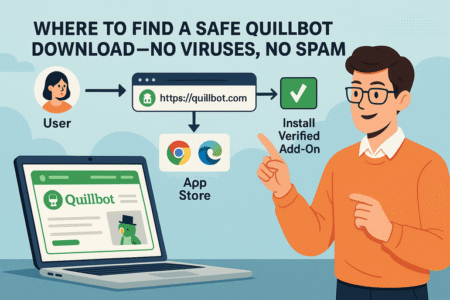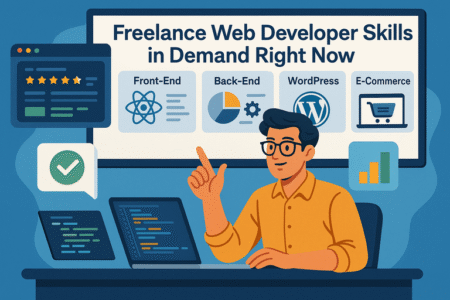Table of Contents
A freelance programmer can often be the difference between a startup idea fading out or becoming the next big thing. When you’re running lean and every dollar matters, the thought of hiring a full-time developer might feel impossible.
But what if bringing in the right freelancer could help you launch faster, stay flexible, and solve critical technical roadblocks?
This article explores exactly why a freelance programmer could be your startup’s lifesaver and whether this approach is the missing piece in your growth strategy.
Access To Specialized Skills Without Long-Term Commitment
Startups often need very specific technical skills, but not around the clock. That’s where a freelance programmer shines.
Instead of locking yourself into the cost and responsibility of a full-time hire, you can tap into expertise only when you need it.
Freelancers Provide Expertise In Niche Technologies
Imagine you’re building an app that requires machine learning for recommendations or blockchain integration for payments. Hiring a full-time specialist might not be practical if you only need that skill for one phase of development.
A freelance programmer lets you borrow high-level expertise without carrying the financial weight of a permanent hire.
What’s powerful here is the access to global talent. Platforms like Upwork or Toptal connect you with programmers who’ve already worked in the exact frameworks or tech stacks you need.
Instead of hiring a generalist developer and hoping they’ll “figure it out,” you can bring in someone who already knows the ins and outs of TensorFlow, Solidity, or Django.
I recommend being very specific in your project briefs — the clearer you are about your technical needs, the faster you’ll find someone who’s done it before.
Hiring On-Demand Developers Reduces Overhead Costs
Hiring full-time staff doesn’t just mean a salary. It means benefits, payroll taxes, equipment, and even office space if you’re not remote-first. With a freelance programmer, you bypass all of that. You’re paying purely for skill and output, not idle time.
Startups, especially in their first year, often face unpredictable workloads. Some weeks you’ll need heavy coding support, and other weeks you might need zero.
Freelance contracts let you expand and contract development hours without carrying deadweight costs. That financial flexibility is gold when cash flow is fragile.
Flexible Contracts Fit Startups’ Unpredictable Needs
Startups pivot fast. You might start out needing an iOS developer, then realize your market wants Android, or you may shift from building a full SaaS platform to testing a lightweight prototype. Freelancers fit neatly into that chaos.
Contracts can be hourly, project-based, or milestone-driven, meaning you can adjust your technical help as your goals shift.
One founder I know started with a freelance developer to build a basic MVP, then extended the contract when early users gave feedback. That flexibility meant they could iterate without being tied down to a rigid full-time hire.
For startups living in constant “adapt or die” mode, this adaptability is essential.
Faster Project Execution And Product Launches
Speed is everything for a startup. Being the first to market or at least moving faster than your competition can determine your survival.
A freelance programmer can help you cut through delays and get to launch mode quicker.
Freelance Programmers Accelerate Development Timelines
Unlike larger teams, where bureaucracy and meetings slow things down, freelancers often work with laser focus. They’re motivated to deliver quickly because their reputation and next job depend on it.
I’ve seen freelance programmers build features in weeks that might have taken a corporate team months due to endless approvals.
For example, if your app requires a payment integration, a freelancer who has already implemented Stripe dozens of times can slot that in faster than a generalist still reading documentation. That expertise shaves off critical development days.
Onboarding Is Quicker Compared To Full-Time Hires
Hiring a full-time employee is slow: Job postings, interviews, salary negotiations, background checks. That process can drag on for months. Freelancers, on the other hand, are usually ready to start within days.
Most freelancers have their own setup — laptop, tools, development environment — so you’re not waiting for IT to onboard them.
From a dashboard invite to your GitHub repo, they can be writing code the same day. That “plug-and-play” efficiency is perfect when you need to hit the ground running.
Freelancers Help Test And Deploy MVPs Rapidly
A minimum viable product (MVP) isn’t about perfection. It’s about getting something into users’ hands fast enough to test assumptions. Freelancers are fantastic here because they’re used to short, project-based work.
Say you need a simple mobile app prototype with just login, profile setup, and a feedback form. A freelance programmer can focus on just those core features without worrying about building the “perfect” system.
Once your MVP gains traction, you can decide whether to keep scaling with freelancers or start assembling an in-house team. That step-by-step scaling makes sure you don’t waste money polishing features your users may not even care about.
Cost-Effective Development For Lean Budgets
Every dollar in a startup budget has to fight for its survival. Hiring a freelance programmer helps stretch resources while still giving you the quality output you need.
Pay Only For Work Completed, Not Idle Time
Full-time developers get paid whether the workload is light or heavy. Freelancers get paid only when they’re actively working on your project. That means your budget directly fuels progress.
Think of it like paying for electricity — you only pay for what you use. If your app development only needs 20 hours of coding this month, that’s all you pay for. That efficiency helps small teams manage runway without burning through funds unnecessarily.
Avoid Employee Benefits And Office Expenses
Employee benefits can easily tack on 30–40% more cost on top of a developer’s salary. Add in things like health insurance, paid leave, and office hardware, and suddenly the cost of one full-time developer can double.
With freelancers, you skip all of that. They come equipped with their own tools, often their own testing devices, and they manage their own taxes and benefits. For a startup, avoiding those overheads is a massive relief.
Scale Your Development Costs As Revenue Grows
Freelancers let you scale in proportion to your income. In the early days, you might just hire for a few hours each week to get a prototype off the ground. As revenue starts to trickle in, you can increase scope and hours.
This “pay-as-you-grow” model is far safer than committing to full-time hires before you even know if your idea is sustainable.
I always suggest startups treat freelance programming as a ladder: Climb up slowly, with each rung representing a new milestone of growth. That way, your development costs never run ahead of your revenue.
Greater Agility In Adapting To Market Shifts
Startups rarely stick to their first plan. One week you’re chasing one feature, the next week you realize your customers want something completely different.
Working with a freelance programmer gives you the freedom to pivot without the headaches of long contracts or big layoffs.
Switch Freelancers As Project Needs Evolve
The reality is: different stages of your startup often require different technical skills. Early on, you might need a front-end developer to get your prototype looking polished. Six months later, you may need a backend specialist to handle scaling when your user base grows.
With freelancers, you’re not stuck trying to retrain someone who isn’t the right fit. You simply hire a new specialist. That agility keeps your product development aligned with your business goals instead of being slowed down by mismatched skills.
I’ve worked with teams that swapped out their developers mid-project because the market shifted, and it was surprisingly painless. They didn’t owe severance or spend weeks rehiring. They just updated the project scope, and the new freelancer jumped in.
Access Global Talent For Diverse Perspectives
One of the hidden superpowers of hiring freelancers is geographic flexibility. You’re not limited to the talent pool in your city. You can pull in expertise from anywhere in the world — which often means faster problem-solving and unique approaches you wouldn’t get locally.
For example, a SaaS founder I know hired a freelance programmer from Eastern Europe who specialized in optimizing database queries. The result? Their app’s loading times dropped by nearly 50%.
A few weeks later, they worked with a UX-focused freelancer from South America who redesigned the dashboard for better user flow. That mix of perspectives created a stronger product than a single local hire could have provided.
Adjust Project Scope Without Red Tape
When you employ full-time developers, every shift in priorities requires internal restructuring, new planning cycles, and often, a lot of friction. With freelancers, you can pivot almost instantly.
If your investors push you to test a new feature by the end of the month, you don’t need to reschedule team sprints or renegotiate contracts. You just adjust your freelancer’s scope, or hire someone new for that feature alone.
This kind of fast maneuvering often makes the difference between catching a wave of opportunity or missing it.
Reduced Risk Compared To Full-Time Hiring
Hiring a full-time employee is a big commitment. For a young startup, that level of risk can be intimidating — and sometimes downright dangerous.
A freelance programmer gives you a safer way to get the work done while protecting your financial stability.
Trial Periods Minimize Long-Term Hiring Risks
Most freelance contracts are project-based or short-term, which means you can test the waters before making a deeper commitment. If a freelancer doesn’t deliver as expected, you can simply move on to the next candidate without the legal and financial headaches of firing an employee.
I usually recommend startups start with a small “test project” when hiring a new freelance programmer — something like fixing a bug or adding a simple feature. This lets you see how they communicate, how clean their code is, and how quickly they work, without risking a full product handover.
Freelancers Allow You To Test Product Viability
Another layer of risk for startups is whether the product idea itself is viable. Hiring a full-time developer before you even know if customers want your product can sink your runway.
Freelancers solve this by helping you build an MVP (minimum viable product) or prototype at a fraction of the cost.
That way, you can gather user feedback before making any long-term commitments. If the idea sticks, you can keep scaling. If it doesn’t, you’ve lost far less money than you would have with full-time salaries on the books.
Lower Financial Commitments Ease Early Pressure
Full-time employees expect regular paychecks, benefits, and sometimes equity. That’s a huge burden for a startup running on limited funding. With freelancers, your financial obligations are lighter and more flexible.
If revenue slows one month, you can scale back the hours or pause projects temporarily. You can’t really do that with a salaried employee without causing chaos.
I’ve seen startups survive tough quarters simply because they had the freedom to hit “pause” on freelance contracts instead of draining their bank accounts to meet payroll.
Building A Stronger Technical Foundation Early
The code you write in the first year of your startup has a ripple effect for years to come. If it’s sloppy or built on the wrong stack, you’ll pay for it later with expensive rewrites and delays. The right freelance programmer can help you set things up the right way from day one.
Freelancers Help Choose Scalable Tech Stacks
Not all programming languages or frameworks are created equal. Some are perfect for rapid prototyping but struggle under heavy user loads. A skilled freelancer can guide you in picking a tech stack that balances speed with long-term scalability.
For instance, I’ve seen startups jump into building apps with quick-fix tools like PHP when their growth plan really demanded Node.js or Python for long-term performance.
A seasoned freelancer can spot those mismatches and steer you toward the right foundation.
Get Guidance On Best Practices And Code Quality
Good code isn’t just about making something work — it’s about making it maintainable. A freelance programmer with solid experience will follow best practices like proper documentation, modular design, and clean version control.
That attention to detail makes it much easier for future developers (freelance or full-time) to understand and build on the work.
I always encourage founders to ask freelancers about their approach to testing, code reviews, and documentation. The answers reveal whether they’re thinking short-term or long-term.
Avoid Costly Technical Debt In The Early Stages
“Technical debt” is what happens when you take shortcuts in coding that later require expensive rewrites. It’s a silent killer for many startups.
Freelancers who have seen this play out in other projects often know exactly where to slow down and build properly instead of patching together quick fixes.
Imagine paying for a freelance programmer to build your login system properly with security best practices versus slapping together something that breaks when your first 500 users sign up.
That early investment saves you from paying double or triple later when you have to rebuild from scratch.
Access To A Wide Network Of Professionals
One underrated perk of working with a freelance programmer is the web of connections they bring along. Freelancers rarely work in isolation — they’re part of informal networks, communities, and teams that can open doors for your startup.
Freelancers Often Collaborate With Other Specialists
Freelancers usually cross paths with designers, testers, and other developers on different projects. This means if you suddenly need a UX designer or a database architect, your programmer might already know someone reliable.
Think of it like a “soft agency” model: Instead of hiring a firm, you gain access to a network of independent pros who already trust each other. I’ve seen freelancers pull in their contacts mid-project, which kept development flowing without the founder having to scramble for new talent.
Referrals Can Lead To Future Partnerships
Good freelancers love making referrals because it strengthens their own reputation. If you’ve built trust with your freelance programmer, don’t hesitate to ask, “Do you know anyone who’s strong at mobile UI?” More often than not, you’ll get a warm introduction.
These referrals aren’t just about plugging skill gaps. They can turn into long-term partnerships. I know a founder who hired one freelance backend developer, then ended up with a full “dream team” built entirely through referrals — each one handpicked by someone already working inside the codebase.
Broaden Your Startup’s Resources Beyond A Single Hire
When you hire a full-time employee, you get one brain. When you hire a freelance programmer, you often get access to a mini-network. That means more ideas, more solutions, and more opportunities.
For a startup that can’t afford an entire department, this is a cheat code. You essentially get the benefits of a larger team without the costs of payroll.
Maintaining Focus On Core Business Goals
Every founder’s biggest challenge is time. You can’t do it all — marketing, fundraising, customer support, and coding. A freelance programmer lets you reclaim your bandwidth by taking over the technical heavy lifting.
Delegate Tech Work To Free Up Founder Bandwidth
If you’re a non-technical founder, coding tasks can eat up your time and energy. Even if you’re technical, spending your day fixing bugs might stop you from pitching investors or building customer relationships.
Delegating development to a freelancer doesn’t just free your schedule — it keeps you operating in your zone of genius. You stay focused on growth and vision while someone else handles the nuts and bolts.
Freelancers Handle Complex Problems Behind The Scenes
Technical issues will always pop up: Server crashes, broken APIs, or last-minute feature requests. Instead of being dragged into firefighting mode, you can let a freelancer quietly solve these problems.
For example, I once saw a startup founder hand off a nightmare database bug to a freelancer over Slack at midnight.
By morning, it was resolved, and the founder never lost focus on preparing their pitch deck. That kind of behind-the-scenes support can be a lifesaver.
Keep Energy On Marketing, Sales, And Growth Strategy
At the end of the day, your startup lives or dies by customers, not code. Yes, the tech matters, but your survival depends on traction, sales, and revenue. I
f a freelance programmer takes care of building features, you get the bandwidth to test pricing models, optimize ad spend, or have those crucial early sales conversations.
That balance — tech progress in the background and growth work in the foreground — is exactly what makes freelancers so valuable in the early stages.
Easier Transition To Building A Full-Time Team Later
Working with a freelance programmer doesn’t mean you’ll never build an in-house team. In fact, freelancers often make the transition smoother when you’re ready to scale.
Freelancers Can Help Train In-House Developers
When you eventually hire junior developers, your freelancer can mentor them. They already know the project’s architecture and quirks, so they can guide new hires on what to watch out for.
This mentorship reduces the learning curve. I’ve seen startups bring on entry-level hires and use freelancers as interim “tech leads” until the team found its footing. It’s a low-cost way to build technical leadership into your early team.
Early Freelance Work Creates Documentation For Scaling
Good freelancers don’t just write code — they leave breadcrumbs. Documentation, README files, and clear commit histories become the foundation your future team can build on.
I always recommend you ask your freelancer to maintain basic documentation as they go. It doesn’t have to be perfect, but even simple notes on how the system is structured can save weeks of head-scratching later.
That documentation is worth its weight in gold once you have multiple developers working in parallel.
Smooth Handoffs Prevent Knowledge Gaps
One fear founders have is losing knowledge when a freelancer moves on. The solution is structured handoffs: have your freelancer walk through the codebase with screen recordings or recorded calls.
Pair this with their documentation, and your new hires will have a map instead of wandering blind.
Handled correctly, the transition from freelancers to full-time staff feels like a natural evolution instead of a painful restart.
Real-World Proof That Freelancers Drive Startup Success
Sometimes theory isn’t enough — you want to know if freelancers really work in practice. The truth is, many successful startups owe their early survival to freelance programmers.
Examples Of Startups That Scaled With Freelance Programmers
Plenty of early-stage startups quietly use freelancers to build MVPs. Think about apps that launched lean and iterated fast — behind the scenes, freelancers often wrote the first lines of code.
These weren’t massive dev teams; they were two or three freelancers working part-time to get something testable in front of users.
I’ve personally worked with a founder who hired a freelance programmer for just six weeks to build a bare-bones app.
That app caught investor attention, led to seed funding, and only then did they build an in-house team. Without the freelancer, they would never have gotten off the ground.
Why Startups Choose Freelancers Before Building Teams
Startups don’t choose freelancers just to save money (though that helps). They choose them because freelancers fit the pace and uncertainty of early-stage life. You can experiment, pivot, and even scrap projects without being locked into payroll.
This agility is why investors often advise founders not to rush into full-time hires too soon. Freelancers give you breathing room while you figure things out.
Long-Term Benefits Of Blending Freelancers With Full-Time Staff
Even once you’ve grown, freelancers don’t lose their value. Many startups keep a hybrid model: a core team of in-house developers plus a rotating bench of freelancers for specialized tasks.
This blend gives you stability with flexibility — your core team handles ongoing development, while freelancers step in for one-off projects, new integrations, or performance optimization. It’s a model that scales without bloating payroll.






